#the U.S. Constitution
Text

On this day, Dec 15th, 1791, the Bill of Rights was ratified.
18 notes
·
View notes
Text

Drew Sheneman, The Star-Ledger
* * * * *
LETTERS FROM AN AMERICAN
HEATHER COX RICHARDSON
AUG 20, 2023
Various constitutional lawyers have been weighing in lately on whether former president Donald Trump and others who participated in the effort to overturn the results of the 2020 presidential election are disqualified from holding office under the Fourteenth Amendment to the Constitution. The third section of that amendment, ratified in 1868, reads:
“No person shall be a Senator or Representative in Congress, or elector of President and Vice-President, or hold any office, civil or military, under the United States, or under any State, who, having previously taken an oath, as a member of Congress, or as an officer of the United States, or as a member of any State legislature, or as an executive or judicial officer of any State, to support the Constitution of the United States, shall have engaged in insurrection or rebellion against the same, or given aid or comfort to the enemies thereof. But Congress may by a vote of two-thirds of each House, remove such disability.”
On August 14 an article forthcoming from the University of Pennsylvania Law Review by William Baude of the University of Chicago Law School and Michael S. Paulsen of the University of St. Thomas School of Law became available as a preprint. It argued that the third section of the Fourteenth Amendment is still in effect (countering arguments that it applied only to the Civil War era secessionists), that it is self-executing (meaning the disqualification of certain people is automatic, much as age limits or residency requirements are), and that Trump and others who participated in trying to steal the 2020 presidential election are disqualified from holding office.
This paper was a big deal because while liberal thinkers have been making this argument for a while now, Baude and Paulsen are associated with the legal doctrine of originalism, an approach to the law that insists the Constitution should be understood as those who wrote its different parts understood them. That theory gained traction on the right in the 1980s as a way to push back against what its adherents called “judicial activism,” by which they meant the Supreme Court’s use of the law, especially the Fourteenth Amendment, to expand the rights of minorities and women. One of the key institutions engaged in this pushback was the Federalist Society, and both Baude and Paulson are associated with it.
Now the two have made a 126-page originalist case that the Fourteenth Amendment prohibits Trump from running for president. Their interpretation is undoubtedly correct. But that interpretation has even larger implications than they claim.
Moderate Republicans—not “Radical Republicans,” by the way, which was a slur pinned on the Civil War era party by southern-sympathizing Democrats—wrote the text of the Fourteenth Amendment at a specific time for a specific reason that speaks directly to our own era.
When John Wilkes Booth assassinated President Abraham Lincoln in April 1865, Congress was not in session. It had adjourned on the morning of Lincoln’s second inauguration in early March, after beavering away all night to finish up the session’s business, and congressmen had begun their long journeys home where they would stay until the new session began in December.
Lincoln’s death handed control of the country for more than seven months to his vice president, Andrew Johnson, a former Democrat who wanted to restore the nation to what it had been before the war, minus the institution of slavery that he believed concentrated wealth and power among a small elite. Johnson refused to call Congress back into session while he worked alone to restore the prewar system, dominated by Democrats, as quickly as he could.
In May, Johnson announced that all former Confederates except for high-ranking political or military officers or anyone worth more than $20,000 (about $400,000 today) would be given amnesty as soon as they took an oath of loyalty to the United States. He pardoned all but about 1,500 of that elite excluded group by December 1865.
Johnson required that southern states change their state constitutions by ratifying the Thirteenth Amendment prohibiting enslavement except as punishment for a crime, nullifying the ordinances of secession, and repudiating the Confederate war debts. Delegates did so, grudgingly and with some wiggling, and then went on to pass the Black Codes, laws designed to keep Black Americans subservient to their white neighbors.
Under those new state constitutions and racist legal codes, southern states elected new senators and representatives to Congress. Voters put back into national office the very same men who had driven the rebellion, including its vice president, Alexander Stephens, whom the Georgia legislature reelected to the U.S. Senate. When Congress reconvened in December 1865, Johnson cheerily told them he had reconstructed the country without their help.
It looked as if the country was right back to where it had been in 1860, with legal slavery ended but a racial system that looked much like it already reestablished in the South. And since the 1870 census would count Black Americans as whole people for the first time, southern congressmen would have more power than before.
But when the southern state delegations elected under Johnson’s plan arrived in Washington, D.C., to be seated, Republicans turned them away. They rejected the idea that after four years, 600,000 casualties, and more than $5 billion, the country should be ruled by men like Stephens, who insisted that American democracy meant that power resided not in the federal government but in the states, where a small, wealthy minority could insulate itself from the majority rule that controlled Congress.
In state government a minority could control who could vote and the information to which those voters had access, removing concerns that voters would challenge their wealth or power. White southerners embraced the idea of “popular sovereignty” and “states’ rights,” arguing that any attempt of Congress to enforce majority rule was an attack on democracy.
But President LIncoln and the Republicans reestablished the idea of majority rule, using the federal government to enforce the principle of human equality outlined by the Declaration of Independence.
And that’s where the Fourteenth Amendment came in. When Johnson tried to restore the former Confederates to power after the Civil War, Americans wrote into the Constitution that anyone born or naturalized in the U.S. was a citizen, and then they established that states must treat all citizens equally before the law, thus taking away the legal basis for the Black Codes and giving the federal government power to enforce equality in the states. They also made sure that anyone who rebels against the federal government can’t make or enforce the nation’s laws.
Republicans in the 1860s would certainly have believed the Fourteenth Amendment covered Trump’s attempt to overturn the results of a presidential election. More, though, that amendment sought to establish, once and for all, the supremacy of the federal government over those who wanted to solidify their power in the states, where they could impose the will of a minority. That concept speaks directly to today’s Republicans.
In The Atlantic today, two prominent legal scholars from opposite sides of the political spectrum, former federal judge J. Michael Luttig and emeritus professor of constitutional law at Harvard Law School Laurence H. Tribe, applauded the Baude-Paulsen article and suggested that the American people should support the “faithful application and enforcement of their Constitution.”
LETTERS FROM AN AMERICAN
HEATHER COX RICHARDSON
#Heather Cox Richardson#Letters From An American#history#Civil War#Insurrection#J. Michael Luttig#Laurence H. Triube#Baude-Paulsen#the U.S. Constitution#the Presidency#violation of oath of office
7 notes
·
View notes
Text
"The Constitution is not a living organism. It's a legal document, and it says what it says and doesn't say what it doesn't say."
Antonin Scalia (1936-2016) U.S. Supreme court justice.
462 notes
·
View notes
Text


USS Constitution arrives in Everett, Washington on July 7, 1933. She was "at the foot of Hewitt Avenue in Everett and opens to visitors. Everett is one stop on a three-year U.S. tour made by the Constitution between 1931 and 1934, a goodwill trip on which the ship travels 22,000 miles and visits 91 ports. The ship's stay in Everett ends on July 14."
Photos courtesy of the Everett Public Library: link
#USS CONSTITUTION#Old Ironsides#United States Class#44-gun Frigate#Original 6 frigates#Sailing Ship#Warship#Ship#United States Navy#U.S. Navy#US Navy#USN#Navy#Everett#Washington#West Coast#July#1933#interwar period#my post
282 notes
·
View notes
Text
"Twenty men have served as the chairman of the Joint Chiefs since the position was created after World War II. Until Milley, none had been forced to confront the possibility that a President would try to foment or provoke a coup in order to illegally remain in office. A plain reading of the record shows that in the chaotic period before and after the 2020 election, Milley did as much, or more, than any other American to defend the constitutional order, to prevent the military from being deployed against the American people, and to forestall the eruption of wars with America's nuclear-armed adversaries. Along the way, Milley deflected Trump's exhortations to have the U.S. military ignore, and even on occasion commit, war crimes. Milley and other military officers deserve praise for protecting democracy, but their actions should also cause deep unease. In the American system, it is the voters, the courts, and Congress that are meant to serve as checks on a President's behavior, not the generals."
#History#The Atlantic#Jeffrey Goldberg#Mark Milley#General Milley#Chairman of the Joint Chiefs of Staff#U.S. Military#U.S. Constitution#President Trump#Donald Trump#Trump Administration#January 6th Insurrection#2020 Election#Politics#Law#Democracy
116 notes
·
View notes
Text
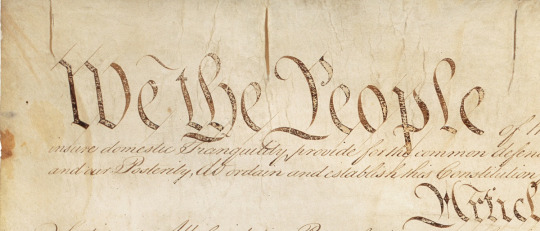

Happy Constitution Day!
Can’t make it to the National Archives Building in person? Check out the hi-res scans in our catalog:
Record Group 11: General Records of the United States Government
Series: The Constitution of the United States
Image description: Zoomed-in portion of the first page of the U.S. Constitution, including the words “We the People.”
Transcription:
We the People of the United States in order to form a more perfect Union, establish Justice, insure domestic Tranquility, provide for the common defense, promote the general Welfare, and secure the Blessings of Liberty to ourselves and our Posterity, do ordain and establish this Constitution for the United States of America.
Article. I.
Section.1. All Legislative Powers herein granted shall be vested in a Congress of the United States, which shall consist of a Senate and House of Representatives.
Section.2. The House of Representatives shall be composed of Members chosen every second year by the People of the several States, and the Electors in each State shall have the Qualifications requisite for Electors of the most numerous Branch of the State Legislature.
No Person shall be a Representative who shall not have attained the Age of twenty-five Years, and been seven Years a Citizen of the United States, and who shall not, when elected, be an Inhabitant of that State in which he shall be chosen.
Representatives and direct Taxes shall be apportioned among the several States which may be included within this Union, according to their respective Numbers, which shall be determined by adding to the whole Number of free Persons, including those bound to Service for a Term of Years, and excluding Indians not taxed, three fifths of all other Persons. The actual Enumeration shall be be made within three Years after the first Meeting of the Congress of the United States, and within every subsequent Term of ten Years, in such Manner as they shall by Law direct. The Number of Representatives shall not exceed one for every thirty Thousand, but each State shall have at Least one Representative; and until such enumeration shall be made, the State of New Hampshire shall be entitled to chuse three, Massachusetts eight, Rhode-Island and Providence Plantations one, Connecticut five, New-York six, New Jersey four, Pennsylvania eight, Delaware one, Maryland six, Virginia ten, North Carolina five, South Carolina five, and Georgia three.
When vacancies happen in the Representation from any State, the Executive Authority thereof shall issue Writs of Election to fill such Vacancies.
The House of Representatives shall chuse their Speaker and other Officers; and shall have the sole Power of Impeachment.
Section.3. The Senate of the United States shall be composed of two Senators from each State, chosen by the Legislature thereof, for six Years; and each Senator shall have one Vote.
Immediately after they shall be assembled in Consequence of the first Election, they shall be divided as equally as may be into three Classes. The Seats of the Senators of the first Class shall be vacated at the Expiration of the second Year, of the second Class at the Expiration of the fourth Year, and of the third Class at the Expiration of the sixth Year, so that one third may be chosen every second Year; and if Vacancies happen by Resignation, or otherwise, during the Recess of the Legislature of any State, the Executive thereof may make temporary Appointments until the next Meeting of the Legislature, which shall then fill such Vacancies.
No Person shall be a Senator who shall not have attained to the Age of thirty Years, and been nine Years a Citizen of the United States, and who shall not, when elected, be an Inhabitant of that State for which he shall be chosen.
The Vice President of the United States shall be President of the Senate, but shall have no Vote, unless they be equally divided.
The Senate shall chuse their other Officers, and also a President pro tempore, in the Absence of the Vice President, or when he shall exercise the Office of President of the United States.
The Senate shall have the sole Power to try all Impeachments. When sitting for that Purpose, they shall be on Oath or Affirmation. When the President of the United States is tried, the Chief Justice shall preside: And no Person shall be convicted without the Concurrence of two thirds of the Members present.
Judgment in Cases of Impeachment shall not extend further than to removal from Office, and disqualification to hold and enjoy any Office of honor, Trust or Profit under the United States: but the Party convicted shall nevertheless be liable and subject to Indictment, Trial, Judgment and Punishment, according to Law.
Section.4. The Times, Places and Manner of holding Elections for Senators and Representatives, shall be prescribed in each State by the Legislature thereof; but the Congress may at any time by Law make or alter such Regulations, except as to the Places of chusing Senators.
The Congress shall assemble at least once in every Year, and such Meeting shall be on the first Monday in December, unless they shall by Law appoint a different Day.
Section.5. Each House shall be the Judge of the Elections, Returns and Qualifications of its own Members, and a Majority of each shall constitute a Quorum to do Business; but a smaller Number may adjourn from day to day, and maybe authorized to compel the Attendance of absent Members, in such Manner, and under such Penalties as each House may provide.
Each House may determine the Rules of its Proceedings, punish its Members for disorderly Behaviour, and, with the Concurrence of two thirds, expel a Member.
Each House shall keep a Journal of its Proceedings, and from time to time publish the same, excepting such Parts as may in their Judgment require Secrecy; and the Yeas and Nays of the Members of either House on any question shall, at the Desire of one-fifth of those Present, be entered on the Journal.
Neither House, during the Session of Congress, shall, without the Consent of the other, adjourn for more than three days, nor to any other Place than that in which the two Houses shall be sitting.
Section.6. The Senators and Representatives shall receive a Compensation for their Services, to be ascertained by Law, and paid out of the Treasury of the United States. They shall in all Cases, except Treason, Felony and Breach of the Peace, be privileged from Arrest during their Attendance at the Session of their respective Houses, and in going to and returning from the same; and for any Speech or Debate in either House, they shall not be questioned in any other Place.
No Senator or Representative shall, during the Time for which he was elected, be appointed to any civil Office under the Authority of the United States, which shall have been created, or the Emoluments whereof shall have been increased during such time; and no Person holding any Office under the United States, shall be a Member of either House during his Continuance in Office.
Section.7. All Bills for raising Revenue shall originate in the House of Representatives; but the Senate may propose or concur with Amendments as on other Bills.
Every Bill which shall have passed the House of Representatives and the Senate, shall, before it becomes a Law, be presented to the President of the
110 notes
·
View notes
Photo
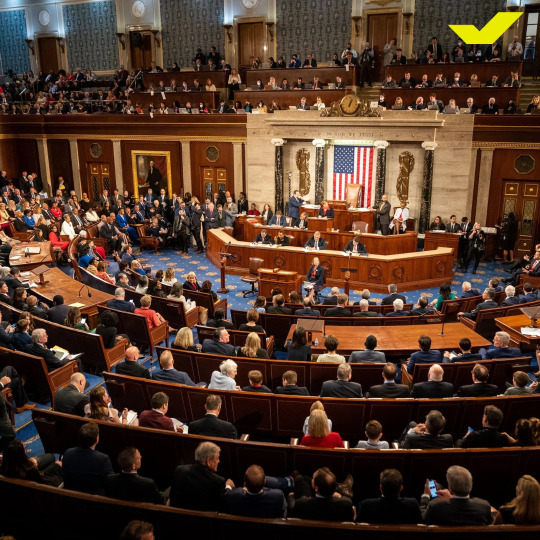
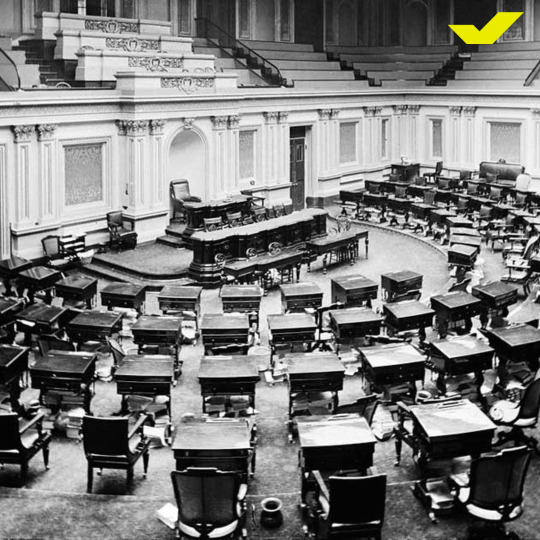
On This Day in 1913: The 17th Amendment was ratified, giving VOTERS the power to elect U.S. Senators instead of letting the state legislatures decide.
As women and people of color won the right to vote, they took their power to the ballot box and voted for Senators that better represented the diversity of our country.
The power should be in the hands of the people. ✊🏽
Exercise YOUR power at the ballot box this year. Register to vote at weall.vote/register.
#OTD#on this day#onthisday#history#1913#17th amendment#the 17th amendment#u.s. constitution#constitution#us constitution#voting#vote#senators#senator#senate#us senate#ballot box#election#elections#popular vote#popular election#diversity#power#register to vote
27 notes
·
View notes
Text

September 25, 1941 marked the 150th anniversary of the ratification of the Bill of Rights. Six thousand people turned up in front of the Sub-Treasury Building on Wall Street for the opening of the three-month celebration. (How many of them would endorse the rights contained in the constitutional amendments is another question.)
Photo: Carl Nesensohn for the AP
#vintage New Yor#1940s#Carl Nesensohn#Bill of Rights#U.S. Constitution#civil liberties#Wall St.#Sub-Treasury Bldg.#September 25#25 September#25 Sept.#Sept. 25
57 notes
·
View notes
Text
A federal judge in Austin on Thursday halted a new state law that would allow Texas police to arrest people suspected of crossing the Texas-Mexico border illegally.
The law, Senate Bill 4, was scheduled to take effect Tuesday. U.S. District Judge David Ezra issued a preliminary injunction that will keep it from being enforced while a court battle continues playing out. Texas is being sued by the federal government and several immigration advocacy organizations. Texas appealed the ruling to the conservative 5th U.S. Circuit Court of Appeals.
Ezra said in his order Thursday that the federal government “will suffer grave irreparable harm” if the law took effect because it could inspire other states to pass their own immigration laws, creating an inconsistent patchwork of rules about immigration, which has historically been upheld as being solely within the jurisdiction of the federal government.
“SB 4 threatens the fundamental notion that the United States must regulate immigration with one voice,” Ezra wrote.
Ezra also wrote that if the state arrested and deported migrants who may be eligible for political asylum, that would violate the Constitution and also be "in violation of U.S. treaty obligations."
"Finally, the Court does not doubt the risk that cartels and drug trafficking pose to many people in Texas," Ezra wrote in his ruling. "But as explained, Texas can and does already criminalize those activities. Nothing in this Order stops those enforcement efforts. No matter how emphatic Texas’s criticism of the Federal Governments handling of immigration on the border may be to some, disagreement with the federal government’s immigration policy does not justify a violation of the Supremacy Clause."
Gov. Greg Abbott signed SB 4 in December, marking Texas’ latest attempt to try to deter people from crossing the Rio Grande after several years of historic numbers of migrants arriving at the Texas-Mexico border.
In a statement, Abbott said the state "will not back down in our fight" and that he expects this case would eventually be decided by the U.S. Supreme Court. On social media, he wrote that he is "not worried" because "this was fully expected."
"Texas has solid legal grounds to defend against an invasion," he added.
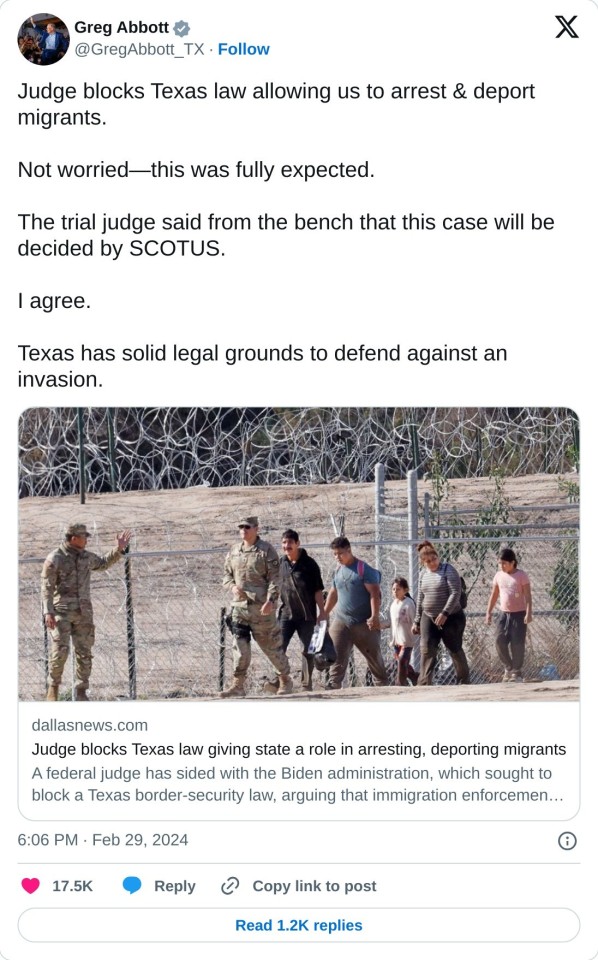
State Attorney General Ken Paxton, whose office is defending SB 4 in court, said in a statement that he "will do everything possible to defend Texas’s right to defend herself."
The law seeks to make illegally crossing the border a Class B misdemeanor, carrying a punishment of up to six months in jail. Repeat offenders could face a second-degree felony with a punishment of two to 20 years in prison.
The law also seeks to require state judges to order migrants returned to Mexico if they are convicted; local law enforcement would be responsible for transporting migrants to the border. A judge could drop the charges if a migrant agrees to return to Mexico voluntarily.
In December, the American Civil Liberties Union, the ACLU of Texas and the Texas Civil Rights Project sued Texas on behalf of El Paso County and two immigrant rights organizations — El Paso-based Las Americas Immigrant Advocacy Center and Austin-based American Gateways — over the new state law. The following month, the U.S. Department of Justice filed its lawsuit against Texas. The lawsuits have since been combined.
During a court hearing on Feb. 15 in Austin, the Department of Justice argued that SB 4 is unconstitutional because courts have ruled that immigration solely falls under the federal government’s authority.
The lawyer representing Texas, Ryan Walters, argued that the high number of migrants arriving at the border — some of them smuggled by drug cartels — constitutes an invasion and Texas has a right to defend itself under Article I, Section 10 of the U.S. Constitution, which prohibits states from engaging in war on their own “unless actually invaded.”
Ezra said that he “is not unsympathetic to the concerns raised by Abbott,” but appeared unconvinced by Walters’ argument.
"I haven't seen, and the state of Texas can't point me to any type of military invasion in Texas," Ezra said. "I don't see evidence that Texas is at war."
Immigrant rights advocates around the state celebrated the ruling because they worried that SB 4 would lead to border residents' rights being violated.
"We celebrate today’s win, blocking this extreme law from going into effect before it has the opportunity to harm Texas communities," said Aron Thorn, senior attorney for the Beyond Border Program at Texas Civil Rights Project. "This is a major step in showing the State of Texas and Governor Abbott that they do not have the power to enforce unconstitutional, state-run immigration policies."
Edna Yang, co-executive director at American Gateways, said that SB 4 does not fix “our broken immigration system” and it will divide communities.
“This decision is a victory for all our communities as it stops a harmful, unconstitutional, and discriminatory state policy from taking effect and impacting the lives of millions of Texans," she said. "Local officials should not be federal immigration agents, and our state should not be creating its own laws that deny people their right to seek protection here in the U.S."
David Donatti, senior staff attorney at the ACLU of Texas, said the ruling is an "important win for Texas values, human rights, and the U.S. Constitution."
"Our current immigration system needs repair because it forces millions of Americans into the shadows and shuts the door on people in need of safety. S.B. 4 would only make things worse," he said. "Cruelty to migrants is not a policy solution.”
#us politics#news#republicans#conservatives#gop#Gov. Greg Abbott#texas#Senate Bill 4#Judge David Ezra#immigrants#immigration#migrants#us mexico border#5th U.S. Circuit Court of Appeals#us constitution#political asylum#Supremacy Clause#Ken Paxton#American Civil Liberties Union#ACLU of Texas#Texas Civil Rights Project#Las Americas Immigrant Advocacy Center#American Gateways#department of justice#2024
23 notes
·
View notes
Text
50 notes
·
View notes
Text
Elizabeth S. Hamilton at the Constitutional Convention, June 1797
Elizabeth Schuyler attended a diplomatic meeting at the age of 6; as a teenager, she hosted politicians solo; her relationship with George Washington predates Alexander Hamilton's. As a married adult, she stood in for Martha Washington, she led the Republican Court in NYC, she led charitable endeavors, and she hosted any number of national and international figures, from bankers to politicians, etc. U.S. presidents through the 1840s paid homage to her. But as so many women of the early Republic were, she was pretty deliberately erased. Particularly excised were the contributions and political activism of the Federalist wives - the amount of influence these women had could not be discussed.
And so by the late 20th century, we have historians writing that ESH didn't like politics and was sickly, usually pregnant, and often absent from her husband, but at least she tried to make a nice cozy environment for the Great Alexander Hamilton to go home and snuggle in, or something like that, as though it didn't occur to these historians that Elizabeth Schuyler likely could have married any number of wealthy, accomplished (and distant relative) men and lived a very comfortable life of luxury in Albany. And yet she looked at the super-charismatic guy who everyone said was brilliant, but with no steady income, not even a lawyer yet and with no ties to Albany, but noted as highly ambitious and said, "yep, he's the one!" Spoiler: she did it because she was ambitious herself and recognized that theirs could be a strong strategic/political partnership, in addition to a strong marriage. (I'm sure it was also good for her ego that he declared himself her best friend after only a few weeks and was so far gone he couldn't remember a military password after an evening with her.)
This erasure led to the common assumption that Elizabeth was not in Philadelphia at the Constitutional Convention in summer 1787. However, statutesandstories.com has posted about new evidence - really, a more careful examination and reading of old documents - that ESH was in Philadelphia in June 1797, and was likely in the city at the time of AH's June 18th speech to the convention. The theory is that she traveled with the Knoxes from NYC to Philadelphia, as she's mentioned in a letter from Knox that she is traveling with them, and she's definitely with AH on June 19th, as they are recorded in a journal/diary at a social engagement also attended by George Washington. Additional conjecture that this letter from AH can be more tightly dated to this period, considering these lines:
I cannot yet determine what will be our stay here and consequently I can make no determinations about my love; but I feel that it will be impossible for me to submit to a long separation however inconvenient it may be to incur the expence which will attend her coming here.
Which may align with EH borrowing money for this travel from her brother-in-law, Stephen van Rensselaer, also possibly more tightly dated to this period.
Please check out the well-cited posts (3 parts): 1, 2, and 3
Although no Hamilton biographers have discussed Eliza’s trip to the Convention in June, historians from Independence National Historic Park (INHP) concluded in the 1980s that Eliza was one of as many as nine wives who likely “attended” the Convention. Part 4 (pending) will discuss Eliza Hamilton’s relationship with the other eight wives who likely were in Philadelphia during the Convention, including Rufus King’s wife, Mary Alsop King, who was a native New Yorker.
This makes total sense to me - not just the documentation presented, but that she would have shown up to perform soft politicking/diplomacy around her husband's activities, in addition to a possible role assisting him in the drafting and editing of his speech. The daughter of Philip Schuyler and Catharine Van Rensselaer wasn't going to sit in NYC on the sidelines for this - she bolstered Hamilton not only in the ways she was personally helpful to him (emotionally, but also going over his writings and speeches with him), but through her representation of the wealthy Dutch-American interests, showing that Hamilton was a junior delegate from NY with a lot of political and financial power backing him.
As the blog states:
Yet it remains possible that Eliza may have helped her husband prepare for his one-of-a-kind speech on June 18. Moreover, it is felt that the possibility of informal, behind-the-scenes contributions by Eliza cries out for further examination.
Cause ya know, she's not discussing new threads for her needlework and thoughts on child-weaning at all these social gatherings or standing in for Martha Washington and chatting with Martha's husband about the best ways to make pastry.
And I just love if she helped advise him on a speech that only the "rich and well-born" can make a strong government. I'm sure they felt quite haughty and proud and said, "let's make another baby!" (James Alexander Hamilton was born around 9 months later.)
13 notes
·
View notes
Text

#jim jordan#house of representatives#U.S. House#speaker of the house#congress#2020 election#january 6#insurrection#liz cheney#constitution#republicans#rethuglicans#trump#MAGA#proud boys#oathkeepers
43 notes
·
View notes
Text
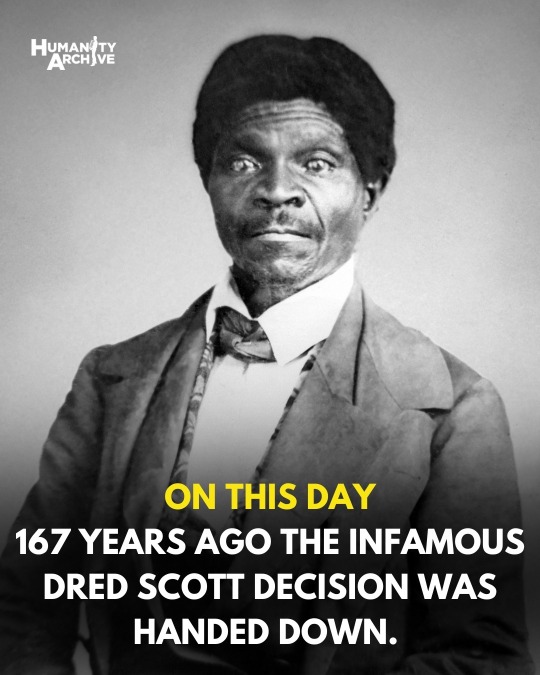
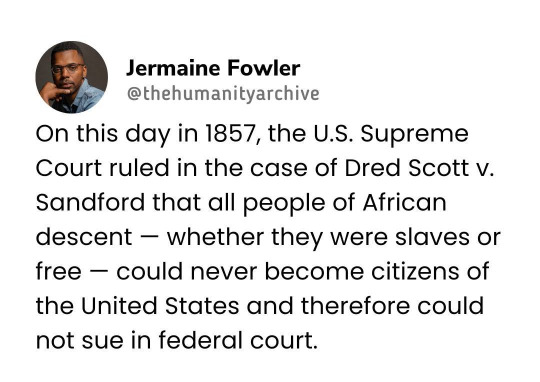

#racism#white racial hatred#white supremacy#white evil#dred scott v. sandford#u.s. supreme court#citizenship rights#racial discrimination#legal precedent#civil rights history#slavery#judicial activism#constitutional interpretation
16 notes
·
View notes
Text
And we now return to the real Shitshow at the Fuck Factory.
Fun fact: Mike Johnson can only afford to lose two Republican votes without needing the help of Democrats to save his Speakership.
Since the Fuck Factory's Shitshow is so...well...shitty right now, the Democrats will actually probably save the Speaker if the vote to oust Johnson goes to the floor. Now, I fully understand everyone who argues that Mike Johnson is terrible and creepy in a way that you're probably uncomfortable with articulating out loud, but actually finding a way to govern is a pretty good hand to play in an election year if you're a member of...you know...the government. Also, Democrats recognize that we have a Democratic President and a Democratic Senate (barely), and it is imperative to make sure that there's not another three-week void without the House of Representatives functioning. I mean, "functioning" is not exactly an accurate description of what the 118th Congress's House of Representatives does, but even though it is a gross, ugly, cancerous appendage it is still a Constitutional necessity.
#Shitshow at the Fuck Factory#Congress#House of Representatives#Speaker of the House#Mike Johnson#Speaker Johnson#Motion to vacate#U.S. House of Representatives#118th Congress#Constitution#Politics#And as always: off is the direction that Marjorie Taylor Greene should fuck#House Speaker#Bring back the Whigs
25 notes
·
View notes
Link
The US set a chilling record earlier this month amid a spate of recent mass shootings: This year marks the third in a row that the country has recorded more than 600 multiple-victim shootings, according to gun violence data.
The Club Q shooting in Colorado Springs that left five people dead and 17 wounded on Sunday marked the 601st mass incident in 2022, according to The Gun Violence Archive, a nonprofit that tracks and records shootings and gun violence throughout the country.
The archive calls mass shootings an "American phenomenon," and defines the incidents as any attack in which there are at least four victims shot, injured, or killed by a gun, excluding the perpetrator. [Remainder omitted.]
#need for U.S. gun control#no absolutes in U.S. Constitution#Second Amendment cannot justify mass shootings
159 notes
·
View notes
Text
okay listen. airing a u.s. political pet peeve here.
setting aside the issue of to-vote-for-biden-or-to-not-vote-for-biden in 2024 and the arguments for and against,
please don't lie to people and tell them voting for a third party presidential candidate is a good idea. please....please don't do that. it won't work. it won't help you. if you want to vote for a third party candidate as a "fuck you" to the republicans or the democrats or both, okay. go for it. but don't tell people that will help, don't expect it will help, it will do exactly nothing.
vote third party in your village, town, school district, city, county, state elections! vote for third-party candidates in your u.s. house races! in those kinds of races a third-party or nonpartisan candidate can have a decent chance of winning, depending. but it 100% won't work for president, and outside some very specific circumstances, probably also won't work in the u.s. senate.
the "third-party" presidential candidates running with most actual established political parties (green party, libertarian party) are not your friends any more than trump or biden are.
#just saw a post telling people to vote third party in the presidential race and i just...#can't stand it. can't let it go. sorry.#you want to be able to meaningfully vote for a third party presidential candidate?#cool! me too!#you're gonna need hundreds of millions of dollars#and a massive media and influence campaign#to successfully amend the u.s. constitution and eliminate first-past-the-post voting. and also the electoral college#it will probably take you 30 years if you start now (please genuinely start now!)#but in the meantime you get TWO choices for president#and you can pick one or the other or neither! but that's all that's meaningfully on the table#like you can put a third-party candidate on your ballot but it's the same as voting for nothing#....except for the rancid political discourse that will follow after the election results come in#which depending on which party wins will blame everyone who voted third party#for the outcome of the election
10 notes
·
View notes